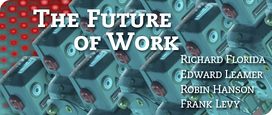One thing I have learned from this exchange: I have to write more clearly so I won’t be misunderstood even by people as smart as Ed. To help focus, I will write this post as Q’s and A’s. Choose anyone you want to be the questioner.
Q: Frank, are you really proposing salary caps as Ed Leamer says?
A: No.
Q: Then why did you bring up the salary caps in professional sports leagues like the NFL.
A: The NFL recognizes that people will lose interest in a pure free market sports league in which a few big market, rich teams do all the winning (my own New York Knicks would be the exception). In the same way, people will lose interest in a pure free market economy where they themselves cannot afford health insurance while the top 1 percent of tax returns claim 16 percent of all income.
Q: But doesn’t that get you back to salary caps?
A: Not at all. A progressive income tax system including an inheritance tax will do the job. The taxes have to raise enough revenue to pay for closing the heath insurance gap and to ensure decent funding for education—i.e. human capital formation.
Q: Ed says you are avoiding the union issue in describing the 1950s. Do you believe unions had and still have a role in solving the inequality problem?
A: Of course, and I should have been more explicit in my previous post. Unions, or to borrow from the Washington Post’s Steve Pearlstein, the threat of a union winning an election would help in terms of the distribution of earnings.
Think about today’s labor market. The rise of computerized work and globalization are limiting the individual bargaining power of most U.S. workers. Without some institutional counterforce, there is little chance that the gains from growth will be reasonably distributed. Do unions’ self-serving work rules retard economic progress? Absolutely. Do they retard progress more than we aging full professors who have tenured jobs with no mandatory retirement? That is a close call.
Q: Are Ed’s “Sticky Jobs” a solution here?
A: They may be a solution for the 3M Corporation but they are unlikely to be a solution for the average worker. The problem with sticky jobs is that there will never be enough of them—the labor market evolves too quickly.
In doing our work on computers, Dick Murnane and I developed a spectrum of tasks that showed how difficult it would be to program a task for a computer or to send it offshore. At the simple end are tasks that can be described in deductive rules—handing out airplane boarding passes. These tasks can be easily programmed or explained to someone 9000 miles away. At the complex end are tasks that require extensive tacit knowledge—writing a convincing advertising campaign or inserting a stent in an damaged artery. Ed’s sticky jobs live in this complicated end of the spectrum. These jobs cannot be programmed because we don’t know the rules. And these jobs can’t be sent offshore because we can’t be sure the offshore producer knows what they are doing. So the jobs end of staying here—i.e. they are sticky.
The problem is that advancing computerization and increasingly sophisticated trading partners continue to transform sticky jobs into free range jobs. Fifteen years ago, speech recognition software could barely recognize a limited vocabulary. Now such software does fine on phrases and is making advances on natural conversation. The same timeline describes the kind of computer work we can send to Bangalore. So sticky jobs are a part of a solution but only a small part.
Q: So what is your bottom line?
A: In this new age, the need for Sticky Jobs and better education are real enough. But we won’t keep inequality within reasonable bounds without institutions that moderate market outcomes.
As we consider the shape of these institutions, we will hear the standard arguments that any attempt to modify the market will reduce wreck the economy by reducing economic efficiency. This observation is another example of the drunk only looking for his watch under the streetlamp. As Steven Pearlstein notes, we do a great job measuring the inefficiency that comes from the minimum wage or higher taxes. But we do a lousy job measuring the inefficiency (and loss of creativity) that comes from economic insecurity, stagnant wages, and shrinking benefits. There are many things we can do without turning our economy into the new France. It is about time we started trying.


